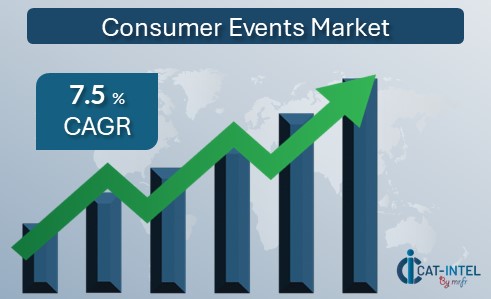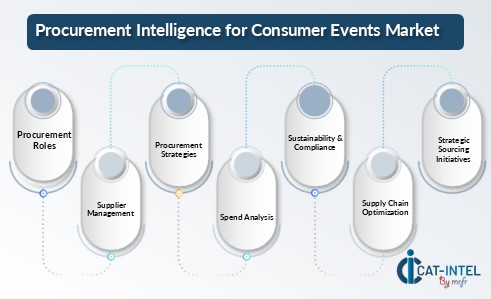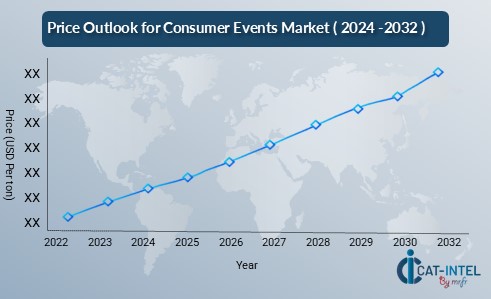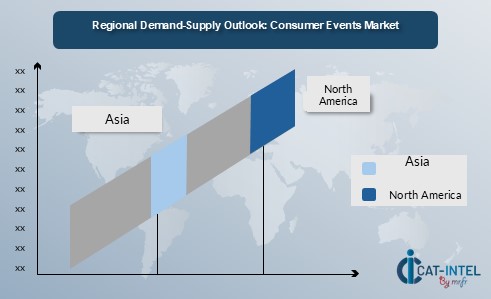Summary Overview
Consumer Events Market Overview
The global consumer events market is undergoing rapid transformation, driven by evolving consumer preferences, digitalization, and increased participation in both virtual and in-person events. The market benefits from growing demand for live experiences, such as concerts, festivals, sports events, exhibitions, and entertainment shows, as well as corporate-sponsored events. Our report provides a comprehensive analysis of emerging procurement trends, highlighting opportunities for cost savings through strategic vendor management, innovative event planning, and technology adoption. We also address future challenges in event logistics and emphasize the importance of digital procurement tools in accurately forecasting demand and managing market dynamics to help clients navigate this competitive landscape. Strategic sourcing and procurement management play a crucial role in streamlining operations, reducing costs, and enhancing attendee experiences. As competition intensifies, companies are leveraging market intelligence solutions and procurement analytics to optimize supply chain management systems for event organization and execution.
The outlook for the consumer events market is promising, with several key trends and projections indicating significant growth through 2032:
-
Market Size: The global consumer events market is expected to reach approximately USD 1.87 trillion by 2032, reflecting a compound annual growth rate (CAGR) of about 7.5% from 2024 to 2032.
Growth rate: 7.5%

-
Sector Contributions: Growth is primarily driven by:
- Live Entertainment and Festivals: Increasing demand for unique, immersive experiences at concerts, festivals, and cultural events is fuelling market growth.
- Sports Events: Rising global participation in sports leagues and tournaments, along with increased sponsorships and broadcasting, is driving demand for event services.
- Corporate Events and Exhibitions: Growing investments in exhibitions, trade shows, and brand-sponsored events for product launches and networking are boosting this segment.
-
Technological Transformation and Innovations: Adoption of digital platforms, including event management software, AI-based data analytics, and virtual/augmented reality tools, is revolutionizing event planning, attendee engagement, and experience personalization. Supplier performance management and vendor assessments are becoming critical for optimizing budgets, ensuring smooth logistics, and enhancing event outcomes in a competitive market. -
Funding Initiatives: Increased investments in event technology, sponsorships, and partnerships are strengthening the consumer events ecosystem, enabling stakeholders to scale operations and meet rising demand. -
Regional Insights: While North America and Europe dominate the consumer events market, the Asia-Pacific region is anticipated to witness rapid growth due to expanding disposable income, rising urbanization, and increasing interest in entertainment and lifestyle events.
Key Trends and Sustainability Outlook
-
Hybrid and Virtual Events: The rise of hybrid and virtual events is transforming the market, providing cost-effective and accessible alternatives for global audiences. -
Sustainability Initiatives: Event organizers are prioritizing eco-friendly practices, such as waste reduction, carbon footprint minimization, and use of sustainable materials. -
Experience-Centric Events: A surge in demand for curated, experience-driven events that focus on personalized attendee engagement is reshaping the industry. -
Technology Integration: Event management software, AI-powered attendee analytics, and cashless payment systems are enhancing operational efficiency and attendee satisfaction.
Growth Drivers:
-
Rising Disposable Income: Increasing consumer spending on entertainment and lifestyle activities is boosting event attendance. -
Corporate Sponsorships: Growing investments by brands and corporations in events to drive marketing and consumer engagement are fuelling growth. -
Digital Transformation: Adoption of advanced digital tools is enabling seamless event execution and improved attendee experience. -
Global Tourism: The resurgence of international travel is contributing to increased participation in major events worldwide.
Overview of Market Intelligence Services for the Consumer Events Market
Recent analyses indicate that the consumer events market is experiencing fluctuations in costs due to rising operational expenses, including venue rentals, technology adoption, and security management. To navigate these challenges, market reports provide detailed cost forecasts and procurement strategies to help stakeholders optimize their event budgets. By leveraging insights from these reports, event organizers, vendors, and sponsors can effectively manage cost volatility while ensuring high-quality event delivery. Implementing strategic sourcing practices and enhancing vendor management will enable stakeholders to mitigate risks, optimize event logistics, and gain a competitive edge in the dynamic consumer events market.
Procurement Intelligence for Consumer Events Market: Category Management and Strategic Sourcing
"To stay ahead in the consumer events market, companies are optimizing procurement strategies, leveraging spend analysis solutions for vendor spend analysis, and enhancing supply chain efficiency through supply market intelligence. Procurement category management and strategic sourcing are becoming vital in achieving cost-effective procurement and ensuring the timely execution of high-quality events for diverse audiences."

Pricing Outlook for Consumer Events Market: Spend Analysis
The consumer events market is currently navigating a dynamic pricing landscape influenced by rising operational costs, technological advancements, and increasing demand for hybrid and live experiences. This dynamic environment reflects the ongoing shifts in consumer expectations, event execution logistics, and global economic conditions.
 Line chart illustrating the pricing outlook for the consumer events industry.
Line chart illustrating the pricing outlook for the consumer events industry.
The chart shows the projected price trends, with costs gradually increasing over the years.
Our advanced analysis indicates a steady upward trajectory in pricing driven by several key factors, including:
-
Rising Operational Costs: Increased expenses related to venue rentals, security management, technology integration, and event staffing are contributing to higher overall costs. -
Demand for Premium Experiences: Growing consumer preference for curated, experience-driven events is driving investments in immersive technologies, exclusive venues, and high-end services, resulting in price increases. -
Hybrid Event Costs: While virtual components lower some logistics costs, the demand for integrated hybrid event solutions adds expenses for digital platforms, content production, and IT support. -
Sponsorship Pressures: Brands and corporate sponsors are increasingly demanding value-driven outcomes, placing additional emphasis on enhancing event quality and ROI, which can influence pricing structures. -
Global Economic Impact: Fluctuations in global economies and travel industries are creating pricing volatility, especially for international events.
Cost Breakdown for the Consumer Events Market Cost saving opportunities

1. Venue Rental (60%)
-
Description: Represents the primary cost of hosting events, including renting conference centres, hotels, or outdoor venues. -
Trends: Venue costs are rising due to increased demand for flexible and hybrid-ready spaces. Major cities report higher rates compared to suburban or alternative locations.
2. Catering (XX%)
3. Marketing & Promotion (XX%)
4. Technology & Equipment (XX%)
5. Staffing (XX%)
6. Decor & Design (XX%)
Cost saving opportunity: Negotiation Lever and Purchasing Negotiation Strategies
In the Consumer Events Market, cost savings can be achieved through strategic procurement and negotiation. Collaborative purchasing allows bulk discounts on supplies, while technology integration, such as event management software, reduces manual labour and enhances efficiency. Negotiating better rates for venues, especially during off-peak seasons, significantly cuts costs. Adopting sustainable practices like energy-efficient equipment and digital materials lowers operational expenses. Optimizing transportation logistics and forming marketing partnerships further reduce costs, ensuring high-quality events while maximizing profitability.
Supply and Demand Overview of the Consumer Events Market: Demand-Supply Dynamics and Buyer Intelligence for Effective Supplier Relationship Management (SRM)"
The Consumer Events Market is experiencing significant growth, driven by evolving consumer preferences and technological advancements.
Demand Factors:
-
Health Consciousness: An increasing focus on healthy eating and nutrition drives demand for almonds as a source of protein, healthy fats, and essential nutrients. -
Plant-Based Diets: The shift toward vegan and plant-based diets amplifies almond consumption as a versatile ingredient in various food products. -
Rising Global Population: A growing population necessitates increased food production, including nut-based products, to meet dietary needs. -
Diverse Applications: Almonds are used in a variety of products, including snacks, dairy alternatives, and cosmetics, further propelling demand.
Supply Factors:
-
California Dominance: California accounts for approximately 80% of global almond production, providing a stable supply to meet international demand. -
Technological Advancements: Innovations in farming practices, such as precision agriculture and efficient irrigation techniques, enhance yield and quality. -
Sustainable Practices: Increasing adoption of sustainable farming practices helps maintain supply consistency while addressing environmental concerns. -
Market Competition: Growing competition among producers drives quality improvements and affects pricing strategies, influencing supply availability.
Regional Demand-Supply Outlook: Consumer Events Market

North America: A Key Player in the Consumer Events Market
-
Leading Market Size: North America holds a substantial share of the global events industry, with the market projected to reach significant growth, reflecting a strong compound annual growth rate (CAGR). -
Diverse Event Types: The region hosts a wide array of events, including music concerts, festivals, sports events, exhibitions, conferences, and corporate seminars, catering to diverse consumer interests. -
Technological Integration: The adoption of advanced event management software and virtual platforms has enhanced event planning and execution, meeting the demand for hybrid and virtual events. -
Focus on Sustainability: There is a growing emphasis on eco-friendly practices within the event industry, aligning with consumer preferences for sustainable and responsible events.
North America remains a key hub for Consumer events market and its growth
Supplier Landscape: Supplier Negotiations and Strategies in the Consumer Events Market
The Consumer Events Market encompasses a diverse and extensive supplier landscape, comprising both global and regional players that supply critical materials and services essential for event planning, execution, and management.
Currently, the supplier landscape is characterized by strong relationships between event organizers and suppliers of event-related services. This collaboration is essential for delivering high-quality experiences, enhancing attendee satisfaction, and ensuring the sustainability of events. Additionally, suppliers of event technologies play a crucial role in supporting the growing demand for innovative and interactive event experiences, particularly in the corporate, entertainment, and retail sectors.
Some of the key suppliers in the consumer events market include:
- Eventbrite
- Cvent
- PSAV (now part of Encore Event Technologies)
- Aramark
- Freeman
- Gartner
- Live Nation Entertainment
- Ticketmaster
- AlliedPRA
- Staging Concepts

Key Development: Procurement Category significant development
Procurement Category |
Key Development |
Event Management Software |
Growing adoption of cloud-based platforms for seamless event planning, registration, and analytics. |
Catering Services |
Increased demand for sustainable and locally sourced food options at events to meet consumer preferences. |
Audiovisual Equipment |
Advancements in virtual event technologies, including high-definition streaming and interactive AV solutions. |
Venue Services |
Rising popularity of hybrid events, requiring venues to support both in-person and virtual experiences. |
Decor and Design |
Trend toward immersive event designs using augmented reality (AR) and interactive installations. |
Transportation & Logistics |
Use of sustainable transportation solutions and real-time tracking for event logistics. |
Security Services |
Enhanced security measures with biometric identification and AI-powered surveillance for large-scale events. |
Technology & IT Support |
Integration of event apps and mobile platforms for real-time engagement and attendee management. |
Marketing & Promotion |
Growing use of influencer marketing and social media platforms to promote events to a wider audience. |
Event Staffing |
Increased use of temporary staffing agencies with specialized skills for virtual and hybrid event needs. |
Procurement Attribute/Metric |
Details |
Market Sizing |
The global consumer events market is projected to grow to USD 1.87 trillion by 2032, with a CAGR of 7.5% during the forecast period. |
Adoption of Technology |
The integration of virtual and hybrid event technologies has surged, with platforms for virtual events growing in demand for real-time streaming and engagement. |
Top Strategies for 2024 |
Focus on enhancing attendee experience through innovative event technologies, sustainability in event planning, and a shift toward hybrid events. |
Automation in Event Management |
Over 30% of event organizers are adopting event management software and automation tools to streamline ticketing, attendee management, and marketing. |
Procurement Challenges |
Key challenges include managing costs amidst inflation, ensuring event security, addressing environmental sustainability concerns, and coping with unpredictable event demand. |
Key Suppliers |
Major players include Eventbrite, Cvent, Freeman, PSAV (Encore), Live Nation Entertainment, and Aramark, offering solutions for event planning and execution. |
Key Regions Covered |
Major markets include North America, Europe, and Asia-Pacific, with significant demand from the U.S., Germany, and China. |
Market Drivers and Trends |
Growth is driven by increasing demand for live and hybrid events, technological advancements, a focus on sustainability, and the rise of experiential marketing. |










